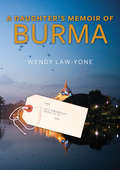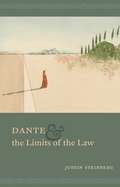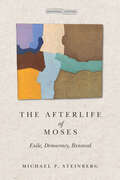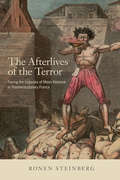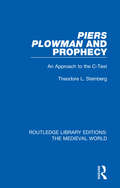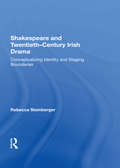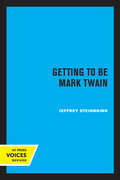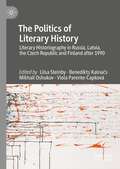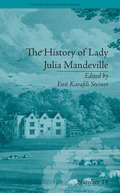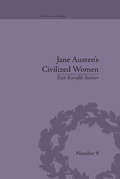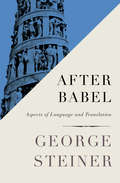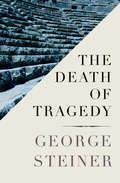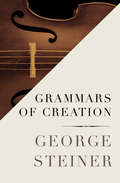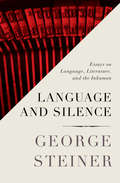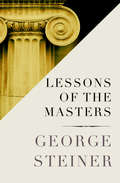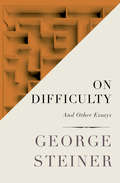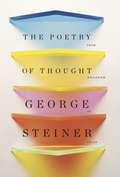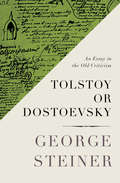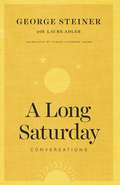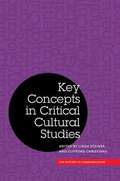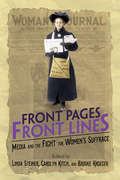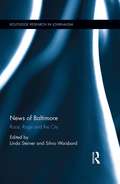- Table View
- List View
A Daughter's Memoir of Burma
by David I. Steinberg Wendy Law-YoneWendy Law-Yone was fifteen at the time of Burma's military coup in 1962. The daughter of Ed Law-Yone, daredevil proprietor of Rangoon Nation, Burma's leading postwar English-language daily, she experienced firsthand the perils and promises of a newly independent Burma.On the eve of Wendy's studies abroad, Ed Law-Yone was arrested, his newspaper shut down, and Wendy herself was briefly imprisoned. After his release, Ed fled to Thailand with his family, where he formed a government-in-exile and tried, unsuccessfully, to foment a revolution. Emigrating to America with his wife and children, Ed never gave up hope that Burma would adopt a new democratic government. While he died disappointed, he left in his daughter's care an illuminating trove of papers documenting the experiences of an eccentric, ambitious, humorous, and determined patriot, vividly recounting the realities of colonial rule, Japanese occupation, postwar reconstruction, and military dictatorship. This book tells the twin histories of Law-Yone's kin and country, a nation whose vicissitudes continue to intrigue the world.
Dante & the Limits of the Law
by Justin SteinbergIn Dante and the Limits of the Law, Justin Steinberg offers the first comprehensive study of the legal structure essential to Dante’s Divine Comedy. Steinberg reveals how Dante imagines an afterlife dominated by sophisticated laws, hierarchical jurisdictions, and rationalized punishments and rewards. He makes the compelling case that Dante deliberately exploits this highly structured legal system to explore the phenomenon of exceptions to it, crucially introducing Dante to current debates about literature’s relation to law, exceptionality, and sovereignty. Examining how Dante probes the limits of the law in this juridical otherworld, Steinberg argues that exceptions were vital to the medieval legal order and that Dante’s otherworld represents an ideal “system of exception.” In the real world, Dante saw this system as increasingly threatened by the dual crises of church and empire: the abuses and overreaching of the popes and the absence of an effective Holy Roman Emperor. Steinberg shows that Dante’s imagination of the afterlife seeks to address this gap between the universal validity of Roman law and the lack of a sovereign power to enforce it. Exploring the institutional role of disgrace, the entwined phenomena of judicial discretion and artistic freedom, medieval ideas about privilege and immunity, and the place of judgment in the poem, this cogently argued book brings to life Dante’s sense of justice.
Law and Mimesis in Boccaccio's Decameron: Realism on Trial
by Justin SteinbergIn Boccaccio's time, the Italian city-state began to take on a much more proactive role in prosecuting crime – one which superseded a largely communitarian, private approach. The emergence of the state-sponsored inquisitorial trial indeed haunts the legal proceedings staged in the Decameron. How, Justin Steinberg asks, does this significant juridical shift alter our perspective on Boccaccio's much-touted realism and literary self-consciousness? What can it tell us about how he views his predecessor, Dante: perhaps the world's most powerful inquisitorial judge? And to what extent does the Decameron shed light on the enduring role of verisimilitude and truth-seeming in our current legal system? The author explores these and other literary, philosophical, and ethical questions that Boccaccio raises in the Decameron's numerous trials. The book will appeal to scholars and students of medieval and early modern studies, literary theory and legal history.
The Afterlife of Moses: Exile, Democracy, Renewal (Cultural Memory in the Present)
by Michael SteinbergIn this elegant and personal new work, Michael P. Steinberg reflects on the story of Moses and the Exodus as a foundational myth of politics—of the formation not of a nation but of a political community grounded in universal law. Modern renderings of the story of Moses, from Michelangelo to Spinoza to Freud to Schoenberg to Derrida, have seized on the story's ambivalences, its critical and self-critical power. These literal returns form the first level of the afterlife of Moses. They spin a persistent critical and self-critical thread of European and transatlantic art and argument. And they enable the second strand of Steinberg's argument, namely the depersonalization of the Moses and Exodus story, its evolving abstraction and modulation into a varied modern history of political beginnings. Beginnings, as distinct from origins, are human and historical, writes Steinberg. Political constitutions, as a form of beginning, imply the eventuality of their own renewals and their own reconstitutions. Motivated in part by recent reactionary insurgencies in the US, Europe, and Israel, this astute work of intellectual history posits the critique of myths of origin as a key principle of democratic government, affect, and citizenship, of their endurance as well as their fragility.
The Afterlives of the Terror: Facing the Legacies of Mass Violence in Postrevolutionary France
by Ronen SteinbergThe Afterlives of the Terror explores how those who experienced the mass violence of the French Revolution struggled to come to terms with it. Focusing on the Reign of Terror, Ronen Steinberg challenges the presumption that its aftermath was characterized by silence and enforced collective amnesia. Instead, he shows that there were painful, complex, and sometimes surprisingly honest debates about how to deal with its legacies. As The Afterlives of the Terror shows, revolutionary leaders, victims' families, and ordinary citizens argued about accountability, retribution, redress, and commemoration. Drawing on the concept of transitional justice and the scholarship on the major traumas of the twentieth century, Steinberg explores how the French tried, but ultimately failed, to leave this difficult past behind. He argues that it was the same democratizing, radicalizing dynamic that led to the violence of the Terror, which also gave rise to an unprecedented interrogation of how society is affected by events of enormous brutality. In this sense, the modern question of what to do with difficult pasts is one of the unanticipated consequences of the eighteenth century's age of democratic revolutions.Thanks to generous funding from Michigan State University and its participation in TOME (Toward an Open Monograph Ecosystem), the ebook editions of this book are available as Open Access (OA) volumes, available from Cornell Open (cornellopen.org) and other Open Access repositories.
Piers Plowman and Prophecy: An Approach to the C-Text (Routledge Library Editions: The Medieval World #49)
by Theodore L. SteinbergOriginally published in 1991, Piers Plowman: An Approach to the C-Text studies what might be called the "mindscape" of Piers Plowman. The book argues that the C-text poem is inspired by the writings of the biblical prophets. The book outlines the fourteenth-century background and discusses the idea of prophecy and how the biblical prophets were read, as well as the role of literary models such as Wyclif and Joachim of Fiore. By examining the specific aspects of the poem, the book shows imaginative connections between the poem and the prophets, offering a unique perspective that Langland’s prophetic stance is complementary to other approaches to the poem.
Shakespeare and Twentieth-Century Irish Drama: Conceptualizing Identity and Staging Boundaries
by Rebecca SteinbergerExploring the influence of Shakespeare on drama in Ireland, the author examines works by two representative playwrights: Sean O'Casey (1880-1964) and Brian Friel (1929-). Shakespeare's plays, grounded in history, nationalism, and imperialism, are resurrected, rewritten, and reinscribed in twentieth-century Irish drama, while Irish plays, in turn, historicize the Subject/Object relationship of England and Ireland. In particular, the author argues, Irish dramatists' appropriations of Shakespeare were both a reaction to the language of domination and a means to support their revision of the Irish as Subject. This study reveals that Shakespeare's plays embody an empathy for the Irish Other. As she investigates Shakespeare's commiseration with marginalized peoples and the anticolonial underpinnings in his texts, the author situates Shakespeare between the English discourse that claims him and the Irish discourse that assimilates him.
Getting to be Mark Twain
by Jeffrey SteinbrinkMark Twain is one of our most accessible cultural icons, a figure familiar to virtually every American and renowned internationally. But he was not always as we know him today. Mark Twain began life as a loose gathering of postures, attitudes, and voices in the mind of Samuel Clemens. It was some time before he took full possession of the personality the world now recognizes. This is the story of the coming of age of Mark Twain. It begins in 1867, with Clemens stepping off the steamship Quaker City and almost immediately declaring himself "in a fidget to move." It comes to a close in 1871, with Clemens settling in Hartford. Mark Twain was substantially formed during the intervening years, as Clemens came East, gained fame and fortune with the publication of Innocents Abroad, courted and married Olivia Langdon, and established himself as a professional writer. Each of these steps represented a profound change in the former Wild Humorist of the Pacific Slope as he sifted through the elements in his personality and began to assume the qualities we now associate with him. The tale that unfolds here shows how, through that process, the Mark Twain of the late 1860s became the Mark Twain of all time. This title is part of UC Press's Voices Revived program, which commemorates University of California Press’s mission to seek out and cultivate the brightest minds and give them voice, reach, and impact. Drawing on a backlist dating to 1893, Voices Revived makes high-quality, peer-reviewed scholarship accessible once again using print-on-demand technology. This title was originally published in 1991.
The Politics of Literary History: Literary Historiography in Russia, Latvia, the Czech Republic and Finland after 1990
by Liisa Steinby Benedikts Kalnačs Mikhail Oshukov Viola Parente-ČapkováThis book looks at literary historiography in Russia, Latvia, the Czech Republic and Finland, focusing on how seismic shifts in state politics and ideology after 1990 changed the writing of national literary histories in these countries. While Russia saw a return to a more nationalist way of thinking about literature and a new emphasis on Orthodox religion after the fall of the Soviet Union, the opposite is true for Latvia, the Czech Republic and Finland. In these countries, literary historiography fosters connections between Western scholarship and literatures written in the national language and engages with questions such as transnationalism, minorities, culture and power, and the cultural construction of identities. This book scrutinizes the different ways in which the construction of national, cultural and European identities has occurred in and through the literary historiography of North-Eastern Europe in the last few decades.
Reading Piers Plowman
by Emily SteinerReading 'Piers Plowman' is an indispensable scholarly guide to a magnificent - and notoriously difficult - medieval poem. With Piers Plowman, the fourteenth-century poet William Langland proved that English verse could be at once spiritually electrifying and intellectually rigorous, capable of imagining society in its totality while at the same time exploring heady ideas about language, theology, and culture. In her study of Piers Plowman, Emily Steiner explores how Langland's ambitious poetics emerged in dialogue with contemporary ideas; for example, about political counsel and gender, the ethics of poverty, secular and pagan learning, lordship and servitude, and the long history of Christianity. Lucid and comprehensive, Steiner's study teaches us to stay alert to the poem's stunning effects while still making sense of its literary and historical contexts.
The History of Lady Julia Mandeville: by Frances Brooke (Chawton House Library: Women's Novels #14)
by Enit Karafili SteinerPublished in 1763, The History of Lady Julia Mandeville was Frances Brooke’s first and most successful novel. This modern critical edition contains an introductory essay on the text, endnotes and textual variants as well as appendices containing contemporary reviews and some of Brooke’s other writing.
Jane Austen's Civilized Women: Morality, Gender and the Civilizing Process (Gender and Genre #9)
by Enit Karafili SteinerJane Austen’s six complete novels and her juvenilia are examined in the context of civil society and gender. Steiner’s study uses a variety of contexts to appraise Austen’s work: Scottish Enlightenment theories of societal development, early-Romantic discourses on gender roles, modern sociological theories on the civilizing process.
After Babel: Aspects of Language and Translation
by George Steiner&“A brilliant work . . . A dazzling meditation on the very nature of language itself&” from the world-renowned scholar and author of The Poetry of Thought (Kirkus Reviews). In his classic work, literary critic and scholar George Steiner tackles what he considers the Babel &“problem&”: Why, over the course of history, have humans developed thousands of different languages when the social, material, and economic advantages of a single tongue are obvious? Steiner argues that different cultures&’ desires for privacy and exclusivity led to each developing its own language. Translation, he believes, is at the very heart of human communication, and thus at the heart of human nature. From our everyday perception of the world around us, to creativity and the uninhibited imagination, to the often inexplicable poignancy of poetry, we are constantly translating—even from our native language.
The Death of Tragedy
by George SteinerAn engrossing and provocative look at the decline of tragedy in modern art"All men are aware of tragedy in life. But tragedy as a form of drama is not universal." So begins George Steiner's adept analysis of the demise of classic tragedy as a dramatic depiction of heroism and suffering. In The Death of Tragedy, Steiner examines the uniqueness and importance of the Greek classical tragedy--from antiquity to the age of Jean Racine and William Shakespeare--as providing stark insight into the grief and joy of human existence. Then, delving into the works of John Keats, Henrik Ibsen, Samuel Beckett, and many more, Steiner demonstrates how the tragic voice has greatly diminished in modern theater, and what we have lost in the process.
Grammars of Creation: Originating In The Gifford Lectures For 1990
by George Steiner"A fresh, revelatory, golden eagle's eye-view of western literature." --Financial TimesEarly in Grammars of Creation, George Steiner references Plato's maxim that in "all things natural and human, the origin is the most excellent." Creation, he argues, is linguistically fundamental in theology, philosophy, art, music, literature--central, in fact, to our very humanity. Since the Holocaust, however, art has shown a tendency to linger on endings--on sundown instead of sunrise. Asserting that every use of the future tense of the verb "to be" is a negation of mortality, Steiner draws on everything from world wars and the Nazis to religion and the word of God to demonstrate how our grammar reveals our perceptions, reflections, and experiences. His study shows the twentieth century to be largely a failed one, but also offers a glimpse of hope for Western civilization, a new light peeking just over the horizon.
Language and Silence: Essays on Language, Literature, and the Inhuman (Peregrines Ser.)
by George SteinerThe evolution and manipulation of language from the celebrated author of After Babel. &“A keenly discriminating literary mind at work on what it loves&” (The New York Times Book Review).Language and Silence is a book about language—and politics, meaning, silence, and the future of literature. Originally published between 1958 and 1966, the essays that make up this collection ponder whether we have passed out of an era of verbal primacy and into one of post-linguistic forms—or partial silence. Steiner explores the idea of the abandonment of contemporary literary criticism, from the classics to the works of William Shakespeare, Lawrence Durell, Thomas Mann, Leon Trotsky, and more.
Lessons of the Masters (The\charles Eliot Norton Lectures #51)
by George SteinerA thought-provoking examination of the complex teacher-student relationship, from one of the great minds of the modern literary worldBased on George Steiner&’s extensive experience as a teacher, Lessons of the Masters is a passionate examination of the &“profession of the professor.&” He writes about what empowers one person to teach another, and explores the complexities and nuances of this bond. From the charismatic master to the loving disciple, Steiner explores the religious, philosophical, economic, and scientific aspects of imparting knowledge, drawing upon history&’s most famous teachers: Socrates, Jesus, Faust, Virgil, Dante, Heloise, and Abelard.
On Difficulty: And Other Essays (Oxford Paperbacks Ser.)
by George SteinerA distinguished collection of essays on language, literature, and philosophy from acclaimed scholar and critic George SteinerOn Difficulty is as provocative and relevant today as when its essays were first published. Ranging from critical topics such as the understanding of language to the meaning of meaning, inward speech to the relationship between erotic sensibility and linguistic convention, these eight essays posit myriad topics for exploration and dialogue. George Steiner deals with considerations that are simultaneously literary and philosophical, exploring themes of linguistic privacy and the changing technical, physiological, and social statuses of the act of reading.
The Poetry of Thought: From Hellenism to Celan
by George SteinerFrom the distinguished polymath George Steiner comes a profound and illuminating vision of the inseparability of Western philosophy and its living language. With his hallmark forceful discernment, George Steiner presents in The Poetry of Thought his magnum opus: an examination of more than two millennia of Western culture, staking out his claim for the essential oneness of great thought and great style. Sweeping yet precise, moving from essential detail to bracing illustration, Steiner spans the entire history of philosophy in the West as it entwines with literature, finding that, as Sartre stated, in all philosophy there is "a hidden literary prose." "The poetic genius of abstract thought," Steiner believes, "is lit, is made audible. Argument, even analytic, has its drumbeat. It is made ode. What voices the closing movements of Hegel's Phenomenology better than Edith Piaf's non de non, a twofold negation which Hegel would have prized? This essay is an attempt to listen more closely."
Tolstoy or Dostoevsky: An Essay in the Old Criticism
by George SteinerThe first book of criticism from the acclaimed author of After Babel—a &“provocative and probing&” look at Russian literature&’s most influential writers (The New York Times). &“Literary criticism,&” writes Steiner, &“should arise out of a debt of love.&” Abiding by his own rule, Tolstoy or Dostoevsky is an impassioned work, inspired by Steiner&’s conviction that the legacies of these two Russian masters loom over Western literature. By explaining how Leo Tolstoy and Fyodor Dostoevsky differ from each other, Steiner demonstrates that when taken together, their work offers the most complete portrayal of life and the tension between the thirst for knowledge on one hand and the longing for mystery on the other. An instant classic for scholars of Russian literature and casual readers alike, Tolstoy or Dostoevsky explores two powerful writers and their opposing modes of approaching the world, and the enduring legacies wrought by their works.
A Long Saturday: Conversations
by George Steiner Laure Adler Teresa Lavender FaganGeorge Steiner is one of the preeminent intellectuals of our time. The Washington Post has declared that no one else “writing on literature can match him as polymath and polyglot, and few can equal the verve and eloquence of his writing,” while the New York Times says of his works that “the erudition is almost as extraordinary as the prose: dense, knowing, allusive.” Reading in many languages, celebrating the survival of high culture in the face of modern barbarisms, Steiner probes the ethics of language and literature with unparalleled grace and authority. A Long Saturday offers intimate insight into the questions that have absorbed him throughout his career. In a stimulating series of conversations, Steiner and journalist Laure Adler discuss a range of topics, including Steiner’s boyhood in Vienna and Paris, his education at the University of Chicago and Harvard, and his early years in academia. Books are a touchstone throughout, but Steiner and Adler’s conversations also range over music, chess, psychoanalysis, the place of Israel in Jewish life, and beyond. Blending thoughts on subjects of broad interest in the humanities—the issue of honoring Richard Wagner and Martin Heidegger in spite of their politics, or Virginia Woolf’s awareness of the novel as a multivocal form, for example—with personal reflections on life and family, Steiner demonstrates why he is considered one of today’s greatest minds. Revealing and exhilarating, A Long Saturday invites readers to pull up a chair and listen in on a conversation with a master.
For Humanity's Sake
by Lina SteinerFor Humanity's Sake is the first study in English to trace the genealogy of the classic Russian novel, from Pushkin to Tolstoy to Dostoevsky. Lina Steiner demonstrates how these writers' shared concern for individual and national education played a major role in forging a Russian cultural identity.For Humanity's Sake highlights the role of the critic Apollon Grigor'ev, who was first to formulate the difference between West European and Russian conceptions of national education or Bildung -- which he attributed to Russia's special sociopolitical conditions, geographic breadth, and cultural heterogeneity. Steiner also shows how Grigor'ev's cultural vision served as the catalyst for the creative explosion that produced Russia's most famous novels of the 1860s and 1870s.Positing the classic Russian novel as an inheritor of the Enlightenment's key values -- including humanity, self-perfection, and cross-cultural communication -- For Humanity's Sake offers a unique view of Russian intellectual history and literature.
Key Concepts in Critical Cultural Studies
by Linda Steiner Clifford ChristiansThis volume brings together sixteen essays on key and intersecting topics in critical cultural studies from major scholars in the field. Taking into account the vicissitudes of political, social, and cultural issues, the contributors engage deeply with the evolving understanding of critical concepts such as history, community, culture, identity, politics, ethics, globalization, and technology. The essays address the extent to which these concepts have been useful to scholars, policy makers, and citizens, as well as the ways they must be rethought and reconsidered if they are to continue to be viable. Each essay considers what is known and understood about these concepts. The essays give particular attention to how relevant ideas, themes, and terms were developed, elaborated, and deployed in the work of James W. Carey, the "founding father" of cultural studies in the United States. The contributors map how these important concepts, including Carey's own work with them, have evolved over time and how these concepts intersect. The result is a coherent volume that redefines the still-emerging field of critical cultural studies. Contributors are Stuart Allan, Jack Zeljko Bratich, Clifford Christians, Norman Denzin, Mark Fackler, Robert Fortner, Lawrence Grossberg, Joli Jensen, Steve Jones, John Nerone, Lana Rakow, Quentin J. Schultze, Linda Steiner, Angharad N. Valdivia, Catherine Warren, Frederick Wasser, and Barbie Zelizer.
Front Pages, Front Lines: Media and the Fight for Women's Suffrage (History of Communication #148)
by Linda Steiner Carolyn Kitch Brooke KroegerSuffragists recognized that the media played an essential role in the women's suffrage movement and the public's understanding of it. From parades to going to jail for voting, activists played to the mass media of their day. They also created an energetic niche media of suffragist journalism and publications. This collection offers new research on media issues related to the women's suffrage movement. Contributors incorporate media theory, historiography, and innovative approaches to social movements while discussing the vexed relationship between the media and debates over suffrage. Aiming to correct past oversights, the essays explore overlooked topics such as coverage by African American and Mormon-oriented media, media portrayals of black women in the movement, suffragist rhetorical strategies, elites within the movement, suffrage as part of broader campaigns for social transformation, and the influence views of white masculinity had on press coverage. Contributors: Maurine H. Beasley, Sherilyn Cox Bennion, Jinx C. Broussard, Teri Finneman, Kathy Roberts Forde, Linda M. Grasso, Carolyn Kitch, Brooke Kroeger, Linda J. Lumsden, Jane Marcellus, Jane Rhodes, Linda Steiner, and Robin Sundaramoorthy
News of Baltimore: Race, Rage and the City (Routledge Research in Journalism)
by Linda Steiner Silvio WaisbordThis book examines how the media approached long-standing and long-simmering issues of race, class, violence, and social responsibility in Baltimore during the demonstrations, violence, and public debate in the spring of 2015. Contributors take Baltimore to be an important place, symbol, and marker, though the issues are certainly not unique to Baltimore: they have crucial implications for contemporary journalism in the U.S. These events prompt several questions: How well did journalism do, in Baltimore, nearby and nationally, in explaining the endemic issues besetting Baltimore? What might have been done differently? What is the responsibility of journalists to anticipate and cover these problems? How should they cover social problems in urban areas? What do the answers to such questions suggest about how journalists should in future cover such problems?
